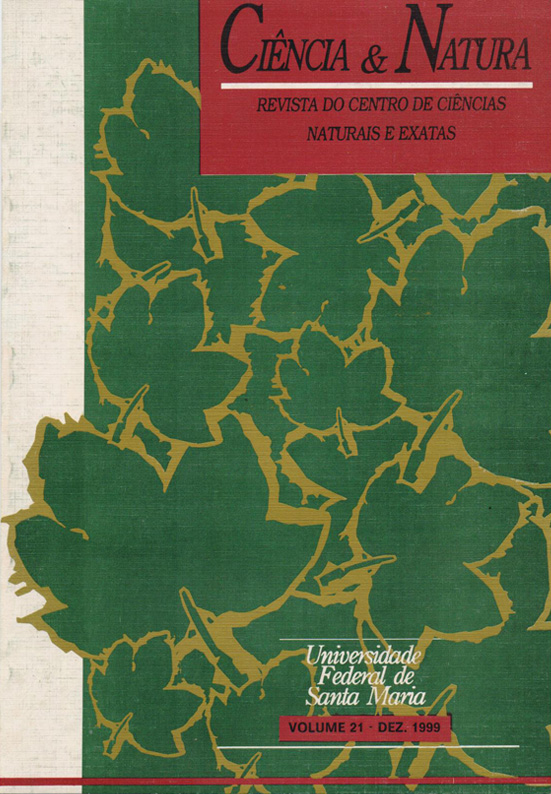Disgenesia do híbrido em populações naturais de Drosophila melanogaster.
DOI:
https://doi.org/10.5902/2179460X27019Resumo
Disgenesia do híbrido é definida como uma síndrome de traços genéticos aberrantes que são induzidos progênie de certos cruzamentos entre linhagens de Drosophila melanogaster. O principal objetivo deste trabalho foi classificar as linhagens recém coletadas quanto ao potencial de atividade do elemento P e sua habilidade regulatória a elementos provenientes de linhagens controles Harwich. Nossos resultados para populações naturais coletadas no Rio Grande do Sul, Brasil, e Colômbia, mostram que estas são do tipo Q, uma vez que todas as linhagens testadas são portadoras do elemento P, por critérios moleculares, e apresentaram uma atividade baixa de P. Do mesmo modo, tais linhagens mostram-se pouco suscetíveis à ação do elemento P. Valores maiores de suscetibilidade e atividade foram encontradas na população colombiana, concordando com a hipótese da distribuição clinal da atividade deste elemento.
Downloads
Referências
BLACKMAN, R. e GELBART, W. Hobo elements in Drosophila melanogaster. In: BERG, D.E. & HOWE, M.M. (ed). Mobile DNA. American Society for Microbiology, Washington, D.C., p. 523-529,1989.
BOUSSY, IA. A Latitudinal cline in P-M gonadal dysgenesis potential in Australian Drosophila melanogaster populations. Genetic Research (Cambridge), 49: 11-18, 1987.
BREGLlANO, J.C. e KIDWELL, M.G. Hybrid dysgenesis determinants. In: SHAPIRO, JA (ed) Mobile Genetic Elements, London, Academic Press, p.363-410, 1983.
ENGELS, W.R. P elements in Drosophila melanogaster. in: BERG, D.E. & HOWE, M.M. Mobile DNA, Washington, Amer. Soc. for Microb, 1989.
JOWETT, T. Preparation of nucleic acids, in: Roberts D. B. (Ed.) Drosophila: a Practical Approach, IRC Press., Washington, DC, pp. 275-286, 1986.
KAPLAN, N., DARDEN, T. e LANGLEY, C. Evolution and extinction of transposable elements in Mendelian population. Genetics, 109: .459-480, 1985.
KIDWELL, M.G. e LlSCH, D. Transposable elements as sources of variation in animals and plants. PNAS 94: 7704-7711, 1997.
KIDWELL, M.G. e KIDWELL, J.F. Selection for male recombination in Drosophila melanogaster. Genetics 84: 333- 338, 1976.
RUFO, V.C., Disgenesia híbrida induzida pelos elementos transponíveis P e Hobo em linhagens de Drosophila melanogaster de diferentes regiões brasileiras. Dissertação de mestrado apresentada ao Curso de PG em Ciências Biológicas da UNESP de São José do Rio Preto - SP, 1997.
SVED, J.A. Hybrid dysgenesis in Drosophila melanogaster. a possible explanation in terms of spatial organization of chromosomes. Aus. J. Biol. Sci. 29: 375-382, 1976.
Downloads
Publicado
Como Citar
Edição
Seção
Licença
Para acessar a DECLARAÇÃO DE ORIGINALIDADE E EXCLUSIVIDADE E CESSÃO DE DIREITOS AUTORAIS clique aqui.
Diretrizes Éticas para Publicação de Revistas
A revista Ciência e Natura está empenhada em garantir a ética na publicação e na qualidade dos artigos.
A conformidade com padrões de comportamento ético é, portanto, esperada de todas as partes envolvidas: Autores, Editores e Revisores.
Em particular,
Autores: Os Autores devem apresentar uma discussão objetiva sobre a importância do trabalho de pesquisa, bem como detalhes e referências suficientes para permitir que outros reproduzam as experiências. Declarações fraudulentas ou intencionalmente incorretas constituem comportamento antiético e são inaceitáveis. Artigos de Revisão também devem ser objetivos, abrangentes e relatos precisos do estado da arte. Os Autores devem assegurar que seu trabalho é uma obra totalmente original, e se o trabalho e / ou palavras de outros têm sido utilizadas, isso tem sido devidamente reconhecido. O plágio em todas as suas formas constitui um comportamento publicitário não ético e é inaceitável. Submeter o mesmo manuscrito a mais de um jornal simultaneamente constitui um comportamento publicitário não ético e é inaceitável. Os Autores não devem submeter artigos que descrevam essencialmente a mesma pesquisa a mais de uma revista. O Autor correspondente deve garantir que haja um consenso total de todos os Co-autores na aprovação da versão final do artigo e sua submissão para publicação.
Editores: Os Editores devem avaliar manuscritos exclusivamente com base no seu mérito acadêmico. Um Editor não deve usar informações não publicadas na própria pesquisa do Editor sem o consentimento expresso por escrito do Autor. Os Editores devem tomar medidas de resposta razoável quando tiverem sido apresentadas queixas éticas relativas a um manuscrito submetido ou publicado.
Revisores: Todos os manuscritos recebidos para revisão devem ser tratados como documentos confidenciais. As informações ou ideias privilegiadas obtidas através da análise por pares devem ser mantidas confidenciais e não utilizadas para vantagens pessoais. As revisões devem ser conduzidas objetivamente e as observações devem ser formuladas claramente com argumentos de apoio, de modo que os Autores possam usá-los para melhorar o artigo. Qualquer Revisor selecionado que se sinta desqualificado para rever a pesquisa relatada em um manuscrito ou sabe que sua rápida revisão será impossível deve notificar o Editor e desculpar-se do processo de revisão. Os Revisores não devem considerar manuscritos nos quais tenham conflitos de interesse resultantes de relacionamentos ou conexões competitivas, colaborativas ou outras conexões com qualquer dos autores, empresas ou instituições conectadas aos documentos.






